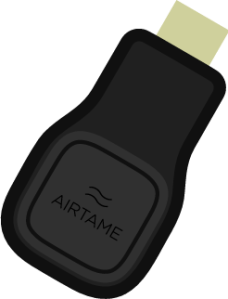 Investors are wont to follow. It therefore shouldn’t be a surprise to see Airtame pick up a VC round of funding.
Investors are wont to follow. It therefore shouldn’t be a surprise to see Airtame pick up a VC round of funding.The Copenhagen-based startup, which is building a nifty wireless HDMI dongle to easily share your computer or phone’s screen to a TV or projector, made headlines in late 2013 for its crowdfunding efforts after raising $1.3 million on Indiegogo in just 60 days.
To add to that pot of cash, the company has closed a $1.4 million seed round led by Danish investment firm SEED Capital and Libratone-founder Tommy Andersen — money it plans to use for a full product launch in the second quarter of this year.
 That’s
not to say that Airtame devices haven’t already begun shipping.
Specifically, I’m told that, of the 15,000 pre-orders that the startup’s
Ingiegogo campaign garnered, just over 3,000 units have already shipped
to backers, providing valuable feedback to the company as it readies to
scale up.
That’s
not to say that Airtame devices haven’t already begun shipping.
Specifically, I’m told that, of the 15,000 pre-orders that the startup’s
Ingiegogo campaign garnered, just over 3,000 units have already shipped
to backers, providing valuable feedback to the company as it readies to
scale up.And scaling up is the name of the game here. When you smash through your crowdfunding target in the way that Airtame did, it creates a new set of problems, albeit nice problems to have. Namely, how to scale up manufacturing much faster than originally planned.
These include the fact that “hardware is hard” and after receiving so many preorders, your original preparation “goes out the window”. “Entrepreneurs don’t heed warnings,” adds Gyalokay.
To that end, since Airtame’s Indiegogo campaign finished, it’s grown the team from 6 to 17 people, mostly in the area of software engineering. The startup has also signed a partnership with Jabil (the world’s 3rd largest electronics manufacturer), which has enabled it to start ramping up production.